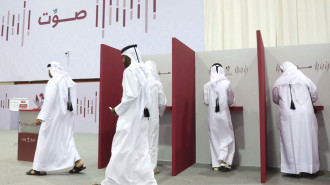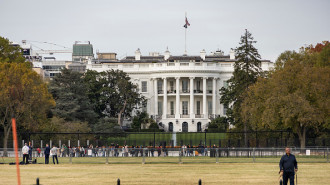Saudi writers launch unprecedented attack on Sisi's Egypt, hint at rift
Signs of a rift between Saudi Arabia and Egypt emerged this week, as Egypt faces an unprecedented economic crisis with the pound falling to new lows and Riyadh appearing reluctant to help.
Saudi writers close to the country's rulers have taken aim at Egypt and its military on Twitter with Saudi Arabia refusing to attend a summit in the UAE looking to provide aid to Egypt to help alleviate its financial woes.
The criticism comes amid continued corruption in the Egyptian military, which dominates the country's political and economic life.
After announcing a $3 billion loan to Cairo, the IMF on 10 January called on the country's Gulf allies to fulfill their promises to invest more in Egypt, which is reeling from the effects of the Russian invasion of Ukraine.
However, one week later both Saudi Arabia and Kuwait stayed away from a Gulf summit called by UAE President Mohammed bin Zayed Al Nahyan. One of the aims of the summit was to provide Egypt with urgent financial aid and it was attended by the leaders of Qatar, Bahrain, Oman, and Jordan in addition to Egyptian President Abdel Fattah al-Sisi.
Soon after the summit ended, Saudi writers launched a barrage of criticism aimed at Egypt and its military. Sisi, a former general in the Egyptian army, led a military coup against democratically elected President Mohammed Morsi in 2013 and assumed the presidency the following year. Gulf states Saudi Arabia and the UAE were seen as highly supportive of the coup.
Leading the new criticism of Saudi Arabia was former academic Turki Al-Hamad, who published seven tweets about Egypt on 26 January.
Al-Hamad lamented how the country had become "the Egypt of unemployment and economic crises" and blamed this on "the increasing hegemony of the army over the state, particularly the economy".
"Nothing happens in the Egyptian state except through the army and under the supervision of the army, through institutions belonging to the army, and for the benefit of powerful people from the army," the Saudi intellectual added.
5)بل هي عدة عوامل لعل من أبرزها،أولا:هيمنة الجيش المتصاعدة على الدولة،وخاصة الاقتصاد،بحيث لا يمر شيء في الدولة المصرية إلا عن طريق الجيش،وبإشراف الجيش،ومن خلال مؤسسات خاضعة للجيش،ولصالح متنفذين في الجيش،كما يرى بعض المراقبين مكامن الأزمة وجذورها،وكل ذلك على حساب مؤسسات المجتمع..
— تركي الحمد T. Hamad (@TurkiHAlhamad1) January 26, 2023
Corruption and aid fatigue
Two days later, Saudi political analyst Khalid Al-Dakheel added: "The root cause of what has happened in Egypt in recent years is because it hasn't left the fold of the military since 1952… but the control of the military over the politics and economy of Egypt don't allow political or economic alternatives to appear."
Saudi Arabia - along with Kuwait, Bahrain, and the UAE - has given Sisi billions of dollars in aid since his 2013 coup.
ما يحصل لمصر في السنوات الأخيرة يعود في جذره الأول إلى أنها لم تغادر عباءة العسكر منذ ١٩٥٢. انكسرت في يونيو ٦٧ وتبخر وهج ٢٣ يوليو كما عرفه المصريون والعرب. لكن سيطرة الجيش على السلطة وعلى اقتصاد مصر لم يسمح ببديل سياسي اقتصادي مختلف.
— خالد الدخيل (@kdriyadh) January 28, 2023
However, much of this money has gone to grand projects with dubious chances of success, such as the New Administrative Capital, rather than more productive schemes.
Sisi's government has frequently been criticised for corruption during its near-decade-long rule of Egypt.
Sayid Abu Al-Kheir, an Egyptian expert on international relations, told the Arabic news site Arabi 21 that the Saudi criticism was aimed at sending a message to Egypt, calling for it to adhere to the terms of the IMF loan and improve its record on corruption.
Much of the aid provided by Saudi Arabia and other Gulf countries to Egypt allegedly made its way into the private bank accounts of senior Egyptian military officers outside the country.
![Saudi writers' criticism of Egypt indicates a rupture in relations between the two Arab states [Getty]](/sites/default/files/styles/large_16_9/public/2023-02/GettyImages-1244585348.jpg?h=1897c4e0&itok=nIqmWz8Y)




 Follow the Middle East's top stories in English at The New Arab on Google News
Follow the Middle East's top stories in English at The New Arab on Google News


